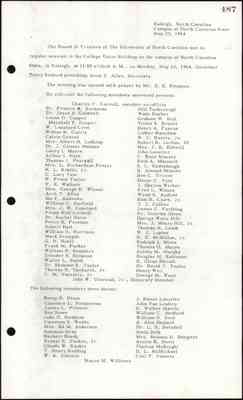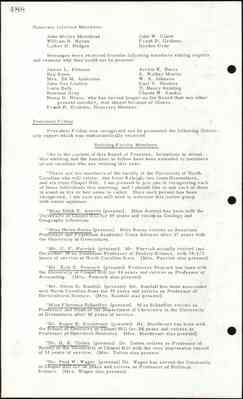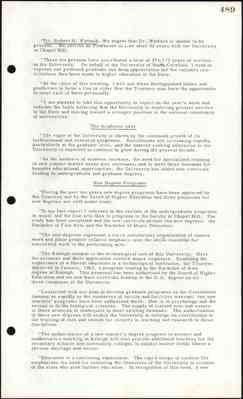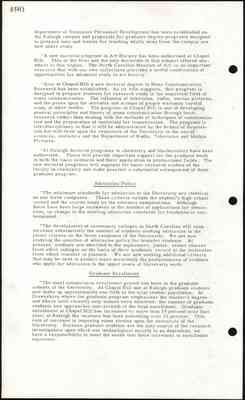Pages
5/25/64 - Reg. B/T
487
Raleigh, North Carolina Campus of North Carolina State May 25, 1964
The Board of Trustees of The University of North Carolina met in regular session in the College Union Building on the campus of North Carolina State, in Raleigh, at ll:00 o'clockA. M., on Monday, May 25, 1964, Governor Terry Sanford presiding; Arch T. Allen, Secretary.
The meeting was opened with prayer by Mr. E. S. Simpson.
On roll-call the following members answered present:
Charles F. Carroll, member ex-officio Dr. Francis A. Buchanan Hill Yarborough Dr. Jesse B. Caldwell Wade Barber Lenox G. Cooper Graham W. Bell Marshall Y. Cooper Victor S. Bryant W. Lunsford Crew Henry A. Foscue Wilbur H. Currie Luther Hamilton Calvin Graves W. C. Harris, Jr. Mrs. Albert H. Lathrop Robert B. Jordan, III Dr. J. Gilmer Mebane Mrs. J. B. Kittrell Larry I. Moore John Lassiter Arthur I. Park C. Knox Massey Thomas J. Pearsall Reid A. Maynard Mrs. L. Richardson Preyer S. L. Rodenbough H. L. Riddle, Jr. B. Atwood Skinner C . Lacy Tate Ben C . Trotter W. Frank Taylor Oscar C. Vatz F. E. Wallace J. Shelton Wicker Mrs. George D. Wilson Fred L. Wilson Arch T. Allen Wyatt R. Aydlett Ike F. Andrews Sam N. Clark, Jr. William C. Barfield T. J. Collier Mrs. J. W. Copeland James C. Farthing Frank Hull Crowell Dr. Dorothy Glenn Dr. Rachel Davis George Watts Hill Percy B. Ferebee Mrs. J. Henry Hill, Jr. Robert Hall Thomas H. Leath William B. Harrison W. J. Lupton Mack Jernigan R. D. McMillan, Jr. G. N. Noble Rudolph I. Mintz Frank M. Parker Thomas O. Moore William P. Saunders Ashley M. Murphy Evander S. Simpson Douglas M. Robinson Walter L. Smith R. Glenn Stovall Dr. Shahane R. Taylor Dr. David T. Tayloe Thomas B. Upchurch, Jr. Henry Weil C. M. Vanstory, Jr. George M. Wood John W. Umstead, Jr. , Honorary Member
The following members were absent: Kemp B. Nixon Clarence L. Pemberton James L. Pittman Roy Rowe John P. Stedman Cameron S. Weeks Mrs. Ed M. Anderson Bowman Gray Herbert Hardy Ernest E. Parker, Jr. Claude W. Rankin T. Henry Redding W. A. Johnson Macon M. Williams J. Hanes Lassiter John Van Lindley R. Walker Martin William C. Medford William G. Reid A. Alex Shuford Dr. L. H. Swindell Irwin Belk Mrs. Mebane H. Burgwyn Archie K. Davis Thomas McKnight D. L. McMichael Carl V. Venters
488
Honorary Lifetime Members:
John Motley Morehead William R. Kenan Luther H. Hodges John W. Clark Frank P. Graham Gordon Gray
Messages were received from the following members stating regrets and reasons why they could not be present:
Archie K. Davis James L. Pittman R. Walker Martin Roy Rowe W. A. Johnson Mrs. Ed M. Anderson Carl V. Venters John Van Lindley T. Henry Redding Irwin Belk Claude W Rankin Bowman Gray Kemp B. Nixon, who has served longer on the Board than any other present member, was absent because of illness. Frank P. Graham, Honorary Member.
President Friday
President Friday was recognized and he presented the following University report which was enthusiastically received:
Retiring Facuity Members
"As is the custom of this Board of Trustees, Invitations to attend this meeting and the luncheon to follow have been extended to members of our faculties who are retiring this year.
"There are ten members of the faculty of the University of North Carolina who will retire: two from Raleigh; two from Greensboro, and six from Chapel Hill. I am pleased to join you in recognizing each of these individuals this morning, and I should like to ask each of them to stand as his or her name is called. Once each person has been recognized, I am sure you will wish to welcome this entire group with warm applause.
"Miss Edith E. Averitt (present). Miss Averitt has been with the University at Chapel Hill for 39 years and retires as Geology and Geography Librarian.
"Miss Helen Burns (present). Miss Burns retires as Associate Professor and Freshman Academic Class Adviser after 27 years with the University at Greensboro.
"Mr. C. F. Parrish (present). Mr. Parrish actually retired last December 30 as Extension Professor of Poultry Science, with 38-1/2 years of service at North Carolina State. (Mrs. Parrish also present).
"Mr. Erie E. Peacock (present) Professor Peacock has been with the University at Chapel Hill for 44 years and retires as Professor of Accounting. (Mrs. Peacock also present).
"Mr. Glenn O. Randall (present) Mr. Randall has been associated with North Carolina State for 39 years and retires as Professor of Horticultural Science. (Mrs. Randall also present).
"Miss Florence Schaeffer (present) Miss Schaeffer retires as Professor and Head of the Department of Chemistry in the University at Greensboro after 42 years of service.
"Dr. Roger E. Sturdevant (present) Dr. Sturdevant has been with the School of Dentistry at Chapel Hill for 14 years and retires as Professor of Operative Dentistry. (Mrs. Sturdevant also present).
"Dr. H. R. Totten (present) Dr. Totten retires as Professor of Botany at the University at Chapel Hill with the very impressive record of 51 years of service. (Mrs. Totten also present.
"Dr. Paul W. Wager (present) Dr. Wager has served the University at Chapel Hill for 38 years and retires as Professor of Political Science. (Mrs. Wager also present).
489
"Dr. Robert H. Wettach. We regret that Dr. Wettach is unable to be present. He retires as Professor of Law after 43 years with the University at Chapel Hill.
"These ten persons have contributed a total of 375-1/2 years of service to the University. On behalf of the University of North Carolina, I wish to express our profound gratitude and deep appreciation for the valuable contributions they have made to higher education in the State.
"At the close of this meeting, I will ask these distinguished ladies and gentlemen to form a line in order that the Trustees may have the opportunity to meet each of them personally.
"I am pleased to take this opportunity to report on the year's work and indicate the basis believing that the University is rendering greater service to the State and moving toward a stronger position in the national community of universities.
The Academic year
"The vigor of the University is shown by the continued growth of its instructional and research programs. Enrollments are increasing rapidly, particularly at the graduate level, and the numver seeking admission to the University is expected to continue to grow during the present decade.
"As the numbers of students increase, the need for specialized training in new subject matter areas also increases; and to meet these demands for broader educational opportunities, the University has added new curricula leading to undergraduate and graduate degrees.
New Degree Programs
"During the past ten years new degree programs have been approved by the Trustees and by the Board of Higher Education and three proposals for new degrees are still under study.
"In my last report I referred to the restudy of the undergraduate programs in music and the fine arts then in progress in the faculty at Chapel Hill. The study has been completed and the new curricula permit two new degrees: the Bachelor of Fine Arts and the Bachelor of Music Education.
"The new degrees represent a more satisfactory organization of course work and place greater relative emphasis upon the skills essential for successful work in the performing arts.
"The Raleigh campus is the technological unit of this University. Here the sciences and their application receive major emphasis. Realizing the importance of a liberal education in a technological institution, the Trustees approved in January, 1963, a program leading to the Bachelor of Arts degree at Raleigh. This proposal has been authorized by the Board of Higher Education and we now have curricula leading to the B. A. degree on all three campuses of the University.
"Consistent with our plan to develop graduate programs on the Greensboro campus as rapidly as the resources of faculty and facilities warrant, two new masters' programs have been authorized there. One is in psychology and the second is in the biological sciences. The supply of trained men and women in these sciences is inadequate to meet existing demands. The authorization of these new degrees will enable the University to enlarge its contribution to the training of men and women for careers in teaching and research in these disciplines.
"The authorization of a new master's degree program in science and mathematics teaching at Raleigh will also provide additional teachers for the secondary schools and community colleges in subject matter fields where a serious shortage now exists.
"Education is a continuing experience. The rapid tempo of modern life emphasizes the need for extending the resources of the University to citizens of the state who seek further education. In recognition of this need, a new
490
department of Extension Personnel Development has been established on the Raleigh campus and proposals for graduate degree programs designed to prepare men and women for teaching adults away from the campus are now under study.
"A new doctoral program in Art History has been authorized at Chapel Hill. This is the first and the only doctorate in this subject offered anywhere in this region. The North Carolina Museum of Art is an important resource that with our own collections provides a useful combination of opportunities for advanced study in art history.
"Also at Chapel Hill a new doctoral degree in Mass Communication Research has been established. As its title suggests, this program is designed to prepare students for research study in the important field of mass communication. The influence of television, radio, motion pictures, and the press upon the attitudes and actions of people warrants careful study of these media. The program at Chapel Hill is one of developing general pronciples and theory of mass communication through basic research rather than dealing with the methods of techniques of communication and the preparation of materials for transmission. The program is interdisciplinary in that it will be administered by the School of Journalism but will draw upon the resources of the University in the social sciences, statistics and the Department of Radio, Television and Motion Pictures.
"At Raleigh doctoral programs in chemistry and biochemistry have been authorized. These will provide important support for the graduate work in both the basic sciences and their application in professional fields. The new doctoral programs will augment the basic research studies of the faculty in chemistry and make possible a substantial enlargement of their graduate program.
Admission Policy
"The minimum standards for admission to the University are identical on our three campuses. These criteria include the student's high school record and the scores made on the entrance examinations. Although there have been large increases in the number of applications for admission, no change in the existing admission standards for freshmen is contemplated.
"The development of community colleges in North Carolina will soon increase substantially the number of students seeking admission to the junior classes on the three campuses of the University. We are now studying the question of admission policy for transfer students. At present, students are admitted to the sophomore, junior, senior classes from other colleges on the basis of their academic record at the institution from which transfer is planned. We are now seeking additional criteria that may be used to predict more accurately the performances of students who apply for admission to the upper years of University work.
Graduate Enrollment
"The most conspicuous enrollment growth has been in the graduate schools of the University. At Chapel Hill and at Raleigh graduate students now make up approximately one-fifth of the total student population. At Greensboro where the graduate program emphasizes the master's degree and where until recently only women were admitted, the number of graduate students now approaches one-seventh of the total enrollment. Graduate enrollment at Chapel Hill has increased by more than 15 percent over last year; at Raleigh the increase has been something over 12 percent. This rate of increase is imposing some strains upon the resources of the University. Because gradutat students are the only source of the research investigators upon which our technological society is so dependent, we have a responsibility to meet the needs that these increases in enrollment represent.




